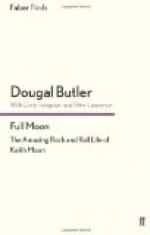“Yes. A will drawn up by a local lawyer—a man with the extraordinary name of Bunkom—a most terrible little creature. Bunkom, indeed!” continued Mrs. Pendleton, shaking her head with a feeble assumption of sprightliness. “Everything is left to my brother Austin. I do not mind in the least about myself. After all, Robert and I met almost as strangers after many years, and I want nothing from him. But his treatment of this unfortunate girl, his daughter, is really too dreadful. I do not wish to speak ill of the dead, but I must say that much, whether Sisily had anything to do with Robert’s death or not, for, of course, Robert couldn’t have known about that at the time—when he made his will, I mean,” concluded Mrs. Pendleton, in some confusion of mind.
“It is strange that your brother did not consult me before drawing up this will,” said Mr. Brimsdown.
“Perhaps he imagined you might persuade him against it,” sighed Mrs. Pendleton. “It is all very strange. I do not understand it a bit.”
Mr. Brimsdown thought it strange, then and afterwards. Next day, after going to the police station and handing Robert Turold’s letter to Inspector Dawfield, he sought out the Penzance lawyer who had drawn up the will. Mr. Bunkom was a spidery little man who spun his legal webs in a small dark office at the top of Market Jew Street, a solicitor with a servile manner but an eye like a fox, which dwelt on his eminent confrere from London, as he perused the will, with an expression which it was just as well that Mr. Brimsdown didn’t see, so sly and savage was it. The Penzance spider knew his business. The will was watertight and properly attested. The bulk of the property was bequeathed to Austin Turold unconditionally. There were only two other bequests. Robert Turold had placed Thalassa and Sisily ("my illegitimate daughter”) on an equality by bequeathing to them annuities of L50 a year each. Austin Turold and Mr. Brimsdown were named as joint executors, and that was all.
Mr. Brimsdown would not have occupied such a distinguished place in the legal profession if he had not been a firm believer in the sacred English tradition that a man has the right to dispose of his own property as he thinks fit. Moreover, his legal mind realized the folly of speculating over the reasons which had prompted this hurried will when the man who had made it was beyond the reach of argument, reproof, or cross-examination.
But the lack of all mention of the title was a different matter, calling for investigation. It was remarkable that a man like Robert Turold should have gone to the grave without binding his heir to prosecute the claim for the Turrald title. To that end Robert Turold had devoted his life, and to the upkeep of the title he had proposed to devote his fortune. The absence of this precaution puzzled Mr. Brimsdown considerably at first, but as he pondered over the matter he began to see the reason. Robert Turold was so close to the summit of his ambition that he had not thought it necessary to take precautions. He was a strong man, and strong men rarely think of death. Once the title was his, it descended as a matter of course to his brother, and then to his brother’s son—provided, of course, that the proofs of his daughter’s illegitimacy were in existence.




